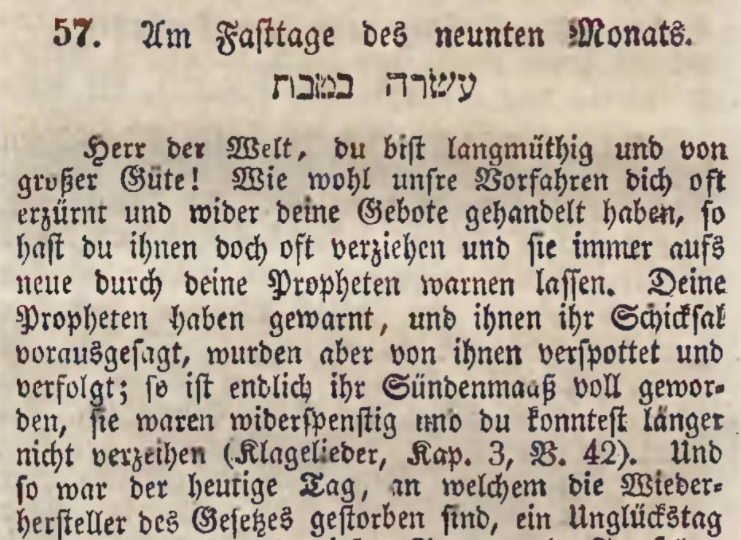TOGGLE COLUMNS (on/off):ADJUST COLUMN POSITIONS: select the column header cell and drag it where you want. show me!COPY INDIVIDUAL COLUMN(S): use CopyTables, a browser extension.
| Source (German) | Translation (English) |
|---|---|
Am Fasttage des vierten Monats.[1] Am 17ten Tage des Monats Thamus. Siehe Anhang. (שבעה עשר בתמוז) |
On the fast day of the fourth month.[2] On the 17th day of the month of Tamuz. See appendix. (שבעה עשר בתמוז) |
Allgerechter Gott! Du hast dich uns offenbart, und uns in den Werken deiner Allmacht, deine Weisheit und Allgüte gezeigt, deine Vaterliebe hat sich uns durch dein göttlich Wort offenbart, und endlich ist das Buch der Geschichte vor uns aufgeschlagen, das uns belehren soll von deiner Weltleitung. Auf daß wir aus den Schicksalen ganzer Völker lernen, daß alles hienieden durch Religion und Tugend bestehet, und daß da, wo man deiner und deiner Gebote vergißt, alle Liebe schwindet, alle Bande der Ordnung und der Gesetzlichkeit gelöst sind. |
All-just God! You have revealed yourself to us, and in the works of your omnipotence, you have shown us your wisdom and goodness, your fatherly love has been revealed to us through your divine word, and finally the book of history has been opened before us, which shall teach us about your world leadership. So that we may learn from the fates of whole peoples that everything in this world exists through religion and virtue, and that where one forgets you and your commandments, all love disappears, all bonds of order and legality are loosened. |
Nach allen Wundern die du in Egypten gethan, nach aller Majestät und der Herrlichkeit die unsere Vorfahren am Berge Sinai gesehen hatten, verfielen sie dennoch wieder in die Finsterniß des egyptischen Götzendienstes, machten sich ein goldenes Kalb und beteten es an. Und der treue Hirt seines Volkes, der treue Diener Gottes, Moses, zerbrach in Unmuth über den Wankelmuth, des seiner Leitung anvertrauten Volkes, die zwei Tafeln auf welche Gottes Hand die großen und heiligen Zehngebote eingegraben hatte. |
After all the miracles you performed in Egypt, after all the majesty and glory our ancestors saw at Mount Sinai, they still fell back into the darkness of Egyptian idolatry, made themselves a golden calf and worshipped it. And the faithful shepherd of his people, the faithful servant of God, Moses, in displeasure over the fickleness of the people entrusted to his leadership, broke the two tablets on which God’s hand had engraved the great and holy Ten Commandments. |
Und dieser Unglückstag war es an welchen gleich böse Handlungen, gleiche traurige Folgen hervorbrachten. Als Israel feist ward, da ward es übermüthig in dem herrlichen Lande der Verheißung, und vergaß seines Schöpfers. Und so begann ihre Strafe am siebzehnten Tage des Monats Thamus. |
And it was on this unlucky day that the same evil actions brought about the same sad consequences. When Israel became fainthearted, she became overconfident in the glorious land of promise, and forgot her Creator. And so their punishment began on the seventeenth day of the month Tamuz. |
Und so ist dieser Tag als unheilbringend oft wiedergekehrt. So laß uns dann nicht vergessen, was du Allgerechter, einst in diesem Monat zum Propheten Ezechiel gesprochen hast: wenn du den Bösen gewarnt hast, und er kehrt nicht zurück von seinem bösen Wandel, so stirbt er in seiner Sünde hin. Du aber hast Dein Leben verwahrt. |
And so this day has often returned as ominous. Let us then not forget what you, the All-Righteous, once spoke to the prophet Ezekiel in this month: “when you have warned the wicked, and he does not return from his wicked ways, he dies in his sin. But you will have saved your life.” (Ezekiel 3:19, Ezekiel 33:9) |
Mögen die Lehren der heiligen uns stets zu einem von Sünden freien Leben erwecken und nach deiner Verheißung sich der Fasttag des vierten Monats in Wonne und Freude verwandeln. Amen. |
May the teachings of the holy ones always awaken us to a life free from sin, and according to your promise, may the fast day of the fourth month turn into delight and joy. Amen. |
“Am Fasttage des vierten Monats” was translated/adapted by Yehoshua Heshil Miro and published in his anthology of teḥinot, בית יעקב (Beit Yaaqov) Allgemeines Gebetbuch für gebildete Frauen mosaicher Religion. It first appears in the 1829 edition, תחנות Teḥinot ein Gebetbuch für gebildete Frauenzimmer mosaicher Religion as teḥinah №28 on pp. 36-37. In the 1835 edition, it appears as teḥinah №28 on pp. 42-43. In the 1842 edition, it appears as teḥinah №30 on pp. 45-46.
We welcome corrections and improvements. The transcription of the German from Latin script in Fraktur type provided machine-readable text for a machine translation by DeepL, which we then edited for accuracy and clarity. –Aharon Varady
Source(s)


Notes

“Am Fasttage des vierten Monats (שבעה עשר בתמוז) | For the Fast of the 17th of Tamuz, a teḥinah by Yehoshua Heshil Miro (1829)” is shared through the Open Siddur Project with a Creative Commons Attribution-ShareAlike 4.0 International copyleft license.










Comments, Corrections, and Queries